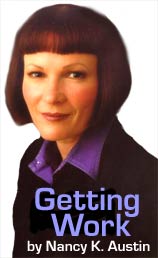 |
|
||||||||||||
|
Columns by Nancy K. Austin: Everyone's a Critic... Even You
List all of Nancy's columns
Visit our other Getting Work Columnist
|
In journalism, they're known as the Five Ws and the H. They're the six hallmark questions that writers are trained to tackle in the early paragraphs of a story. Granted, there's more to sparky writing than explaining who, what, when, where, why, and how -- but you'd better deliver rock-solid answers if you expect readers to hang in there with you. If you're wondering why I'm bringing this up in the first place, it's because IPs of all stripes have to wrestle with their own special Five Ws and the H. No matter who's grilling you or why, there's a lot riding on how well you handle these six common queries, maybe even your next gig or your professional standing. You really don't want to blow it. So here's the IP version of those good old questions, enhanced by what I like to call the Three C's -- careful, complete, and convincing -- adjectives that should always apply to your answers so that they're never obtuse, obnoxious, or overlong. "Who was your biggest influence?" Sure, you're braving it out there on your lonesome, but we're all judged, for better or ill, by the company we keep (and the references we supply, let's not forget). Sprinter Maurice Greene, who at the Sydney Olympics won a gold medal for the U.S. in the hundred-meters, graciously credited his coach, former Olympian John Smith, for that success, which made Greene an even bigger winner. And come November, we'll elect ourselves a new President, and our votes will be influenced, to a certain degree, by what we think of the candidates' running mates. Same deal for IPs. Not only do your friends, colleagues, and heroes say something about what you're made of, it's not an accident that this is a favorite question of journalists and other media types who would kill for a human interest tidbit to jazz up their stories. When you come under a camera's awful gaze, you'll be glad you gave this one some real thought. As always, keep your answer brief and to the point. If it were me, I'd say my biggest influence was Mrs. McGlashan, the impossible-to-please high school English teacher who worked me like a plowhorse and made me think I could write. Resist the urge to embellish: this is not the place for sob stories, lectures, or sappy family sagas. Heroes, yes; horrors, no. "What do you do?" Sounds like a no-brainer, right? Well, it turns out to be anything but. On this question I part company with the experts who always seem to be urging people to seize this as the perfect opportunity to make a blatant sales pitch. For example, you might be coached to spew something like "I'm a [doesn't matter what you do -- dog groomer/cheese taster/investment counselor], and I identify and solve strategic problems for my clients. If you'll tell me what business you're in, I'll show you what I mean." I guess this is supposed to prove how you go for the gusto and all, but personally, this kind of predatory shtick makes me want to hurl. Nobody in their right mind enjoys being hijacked into a sales pitch, and to advocate such a boneheaded approach is to completely ignore the most powerful rule of communication: listening is way more important than being glib. Research studies show that we think good listeners are smarter and more trustworthy, two big points in your favor. That's why it's better to reply, "I'm an antiques appraiser/landscape architect/custom tailor," and jump immediately to "How about you, what do you do?" Your goal is to be all there, listening with all your might, not sliming everybody with gimmicky, self-important patter. "When are you going to get a real job?" This is the archetypal challenge that still raises the hackles of many an IP. That's because it hisses with hostility, and that's what flips you out (and who can blame you?). Right away you can see there are a couple of problems here. First, devising a killer comeback. Then controlling your gut reaction, which is, naturally, to pound the louse's face into hot asphalt. Something like that. Your response depends heavily on whose inquiring mind wants to know about your employment status. Notice what happens when you tack "Mommy" or "Daddy" on the end of that question. All of a sudden you've hurtled from "You want a piece of me, you maxi-zoom-dweebie?" to "Oh, honey, Mommy does have a real job, and she's smart/lucky/happy because she's successful and independent, and she gets to work right here at home." Kids might toss out a couple of follow-up questions -- usually of the Five Ws and the H variety -- but most of the time a single question will be all. Not so when you're hassled by some smug anti-1099 type who brandishes the real-job question like a switchblade. Hearing your answer is the last thing he cares about; he wants to yank your chain by disguising a put-down as a question and rubbing your independent nose in it. Think of this as a verbal hit-and-run, the coward's choice. Assuming you can stand it, keep your shirt on and your mouth shut. Lock eyes, and to show your superior character, walk away from this lamehead. If you can't stop yourself from saying something to even things out between you, for heaven's sake, just please keep it brief: "When this one stops paying so well," usually does the trick. Oh, and by the way, it helps to flash the brightest smile you've got. For those times when you're up for a little uh, conversation -- you can always riposte with a question of your own: "Why do you ask?" is a defensive retort that's old as the hills, but it works like a charm. Before he knows what hit him, your interrogator is the one forced to explain, not you. Fair warning: this can turn a little chat into a regular hurly-burly, so it's not a wise move when you only want to be rid of the dude. "Where did your first client come from?" In the whole English language, there's nothing more irresistible than the phrase, "Let me tell you a story," and this and other questions that call for retrospection are a great excuse to take it out for a spin. Rather than fumbling, "Oh, my first client -- gee, I really can't remember," cast your mind back to your first nerve-wracking engagement (almost by definition, first jobs freak you out). Did you pick up that client by lucky chance? By going to a networking meeting? Did somebody recommend you? The Yellow Pages? Press release? How? Knowing the precise details will make it a compelling story. Now condense that experience into a short (maybe three or four lines) story. Start with "Let me tell you a story," and stand back. Before Tom Peters and I went off on a national book promotional tour, we composed our own list of questions and answers, made copies, and handed them out to press people along the way. Each answer contained at least two detailed little stories -- fun to use in an interview because they made for memorable, concrete answers. Interviewers loved us for doing that, since it saved them tons of prep time by eliminating the need to dream up their own questions about our 500-plus page book. A story's basic building blocks are a beginning, a middle, and an end. If you have an ear for what's funny, throw that in, too, but it's not essential. You'll often get this where'd-the-client-come-from question from a neophyte IP who's understandably nervous about building a nice, fat, clientele and is clueless about where to start. She's looking for ideas she can steal, so give her break. Make it easy, instructive, and reassuring. "Why did you become an IP?" There are two main reasons why people take it into their heads to strike out on their own: they're pissed off, or they're on fire with a cause. Period. You don't commit yourself to a 1099 kind of life because you're lukewarm about it. Let your answer reflect that. People often ask soloists this question because they themselves are toying with the idea of professional independence, and they want to gauge how their motivations stack up with yours. If you make your decision sound surgically neat and antiseptic, you're leaving out the best, the most compelling part: the roller coaster ride, the thrills, the stuff that keeps you awake at night. So you got fired and you had no choice but to go it alone, so what? No need to compulsively volunteer every gory detail, just the big picture will do. You can simply say, "Because I love being independent," or "Because I hated being cooped up in a big corporation," or "Because I crave my own creative space." Those hot, expressive verbs belong in your answer, because this is fundamentally emotional territory. This is no time to haul out the blueprints and decision trees. "How much do you want to succeed?" Ron Stern, an independent CPA in San Mateo, Calif., says if he could ask IPs only one question, this would be it. For his money, it's a Rorschach that disgorges the most useful information. "I'm listening for a game plan," he says, "and to see if you're disciplined, because you'll work longer hours as an IP, and there's nobody around who'll make you do it." Stern, whose clients include dozens of successful independents, agrees that you can't make it without passion, but adds that he's also looking for signs of "paranoia, because that tells me you're a worrywart, and if you're worried about where your next sale is coming from, you'll always do well." Before you meet with anyone who's in a position to help you crank your business up a notch or two, practice answering Stern's question. Keep in mind that even if it's not asked directly, it's surging under surface conversation. Embrace it as part of your business plan. Keep your spiel short and direct, and don't fidget; this is not a time to let the jim-jams get to you. Stay cool, and show that you've thought about this. Don't hedge, brag, or get insulted. Demonstrate your good, balanced judgment by focusing on your profession's upside, downside, and why you think you're someone who can pull this off. So make yourself comfortable with this Five Ws and the H list. Change it to suit your own circumstance. Write down each question, consider your answers, and write those down, too. Revisit it every now and then, as your business and perspective changes. When you take it out for a test drive, floor it. |
|||
|
We'd love to hear your feedback about this column, or put you in touch with Nancy K. Austin if you like. You may also like to see her biography. |
The 1099 name and logo are trademarks of 1099 Magazine.



